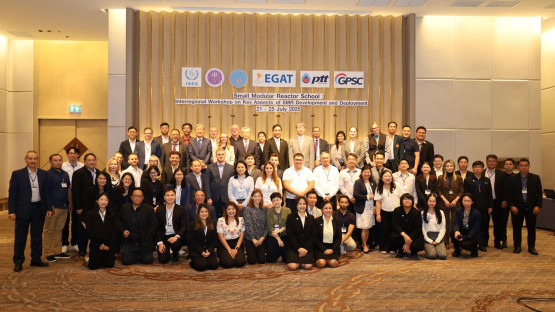Policy makers in Asia have been learning about small modular reactors as part of a new IAEA initiative to inform governments, regulators and industry about the technology’s potential role in the energy mix.
Hosted by Thailand, the second small modular reactor (SMR) workshop, known as an SMR School, came as momentum behind nuclear energy grows in Asia and beyond. The region is stepping up efforts on nuclear energy, with Asia responsible for two-thirds of the world’s reactors under construction — mostly in China, with Uzbekistan starting construction of SMRs.
While the SMR School was underway in Bangkok from 21–25 July, IAEA Director General Rafael Mariano Grossi visited nearby Singapore, reaffirming IAEA support for countries in the Association of Southeast Asian Nations (ASEAN) that are evaluating nuclear including SMRs as part of their clean energy strategies.
Nuclear power and ASEAN
“This visit confirmed what we are seeing worldwide: momentum is building, and ASEAN’s interest in nuclear energy is real and promising,” Mr Grossi said in Singapore. “This stable and low-carbon option clearly has a role to play in the region’s energy future.”
The SMR School was hosted by Thailand’s Office of Atoms for Peace (OAP), the country’s nuclear regulatory body, and brought together around 40 participants from Azerbaijan, Cambodia, Estonia, Jordan, Kazakhstan, Kuwait, Malaysia, Mongolia, Saudi Arabia, and Uzbekistan as well as 50 Thai officials. The workshop followed the inaugural SMR School held in Kenya in May 2025 for the Africa region and is part of IAEA efforts to support informed decision-making around SMRs.
“The urgency of climate action is greater than ever,” said Rungrueng Kitphati, Acting Secretary General of the OAP. “Thailand is actively exploring the role that SMRs can play in our country’s energy mix, and we are committed to building a strong legal, regulatory and human resource foundation in line with international safety standards.”
Global SMR developments
SMRs are smaller with lower upfront costs and greater flexibility than traditional nuclear power plants and look set to widen access to nuclear power. The reactors are under development in several countries with units already operational in China and the Russian Federation, and interest is growing after a global consensus on expanding nuclear energy was reached at COP28 in Dubai in 2023.
“This school in Thailand was an opportunity to bring support to a new range of countries, from Central and Southeast Asia to the Middle East and Europe,” said Dohee Hahn, Coordinator of the IAEA SMR Platform. “Participants included countries only now exploring SMRs, as well as those actively preparing for deployment.”
Over the five-day programme, participants examined the technical, regulatory, economic and infrastructure aspects of SMR development — including energy system planning, safety and licensing, financing, legal frameworks, waste management, emergency preparedness, and stakeholder engagement. The curriculum was designed to reflect both the opportunities and the practical considerations of adopting SMRs.
A session on the strategic role of SMRs in achieving net zero was also held, with officials from OAP and the Thai Ministry of Energy joined by representatives of the Electricity Generation Authority of Thailand, PTT Public Limited Company and Global Power Synergy Public Company Limited. Liu Hua, IAEA Deputy Director General and Head of the Department of Technical Cooperation, delivered remarks on behalf of IAEA Director General Grossi.
SMR lessons learned
“We came with many questions: Why do we need these technologies? How do we ensure their safety? What skills are needed?” said D. Baltabaev of the Uzatom Atomic Energy Agency of Uzbekistan, which is preparing to deploy its first SMRs. “We found not only answers but gained a strong understanding of engineering and regulatory aspects — and the confidence that SMRs are part of a sustainable, reliable energy future.”
Noor Mashruddin of Malaysia’s Ministry of Energy, Green Technology and Water, agreed the SMR School had offered a valuable learning experience. “It has been very useful,” she said. “I appreciated hearing about the other countries’ experiences, sharing best practices, and getting feedback from the IAEA experts.”
Thailand, which explored nuclear power in the past, is now taking a fresh look in light of changing global and regional dynamics. “There were plans in the past, but they didn’t move forward for various reasons,” said Siriwat Chedsi of the Electricity Generating Authority of Thailand. “Today, things are different. The urgency is real. The technology has improved. That’s why nuclear — specifically SMRs — is once again part of the conversation, with more serious intent than ever before.”
IAEA support on SMRs
The SMR School is part of a wider package of IAEA support, including the SMR Platform and the Nuclear Harmonization and Standardization Initiative (NHSI), which assist countries in building the infrastructure needed for SMR development, deployment and oversight. The next SMR School will be held in Buenos Aires, Argentina, from 25–29 August, with additional sessions planned for 2026.








